Ernst Lissner
Ernst-Johann Nicholas Ernestovich Lissner (1874-1941) was a Russian painter and graphic artist, owner of a private art studio and the printing press "E. Lissner and J. Roman" in Moscow. He is best known by a series of historical paintings and lithographs devoted to the Polish–Muscovite War (1605-1618) and the Seven Years' War.
Life and career
In 1900-1908 he studied at the Imperial Academy of Fine Arts in Saint Petersburg.[1] His graduate work was a painting named Greetings to you, heroes of labor. From 1909 he participated in Art exhibitions, being an exhibitor and member of various associations of visual artists and art societies, such as the Society for Travelling Art Exhibitions, the Society of Artists Free Arts (1911-1918), and others.
After the October Revolution of 1917 and the Russian Civil War, Lissner continued to work as painter, and also actively took part in the turbulent social and artistic life of the first decade of the Soviet Union. In the 1920s he became a member of Moscow groups and associations of soviet artists, such as Art to working people (1925-1928), Wing (1926-1928), and the Repin Society of painters (1924-1929).[2]
Works
- The beginning of a battle between the Bolotnikov army and tsarist troops in Lower Kotlov near Moscow
- Battle of the Nikitsky Gate in the October 1917
- The expulsion of Polish invaders from the Kremlin, Moscow
- The uprising in Moscow in 1648
Gallery
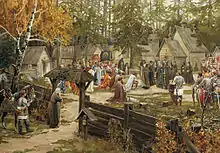
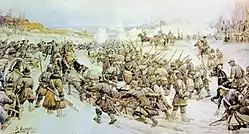 Bolotnikov's Battle with the Tsar's Army at Nizhniye Kotly Near Moscow
Bolotnikov's Battle with the Tsar's Army at Nizhniye Kotly Near Moscow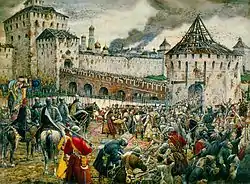 The Poles surrender the Moscow Kremlin to Prince Pozharsky in 1612.
The Poles surrender the Moscow Kremlin to Prince Pozharsky in 1612.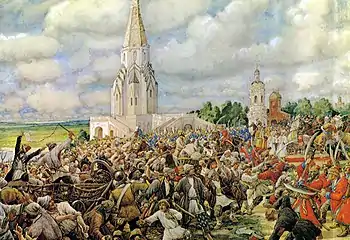 Copper Riot. 1662. (1938)
Copper Riot. 1662. (1938)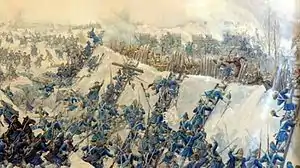
References
- Rare Books. "A report on the activities of the Imperial Academy of Fine Arts in 1908" (in Russian). Rare Books.ru. Retrieved 15 February 2012.
- Art Catalogue. "Ernst Ernestovich Lissner". Encyclopedia of painting and drawing (in Russian). Art Catalog.ru. Retrieved 15 February 2012.
- Attribution
- This article is based on the translation of the corresponding article of the Russian Wikipedia. A list of contributors can be found there at the History section.